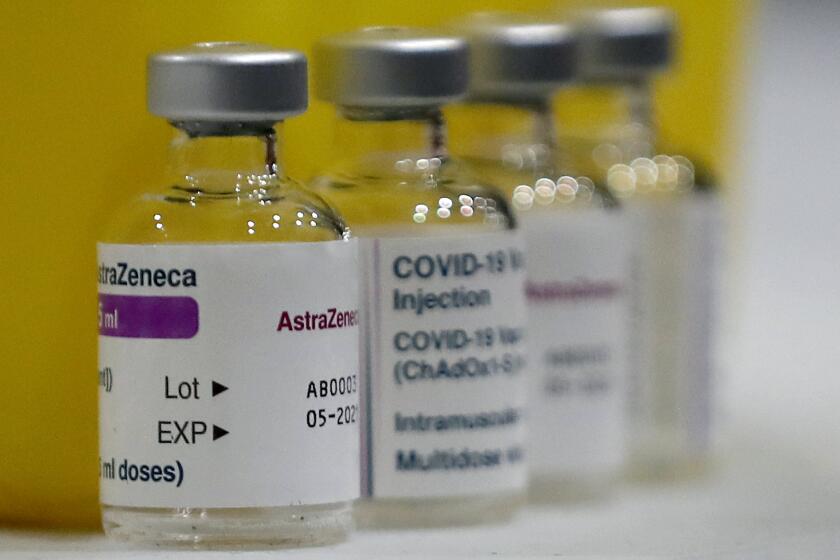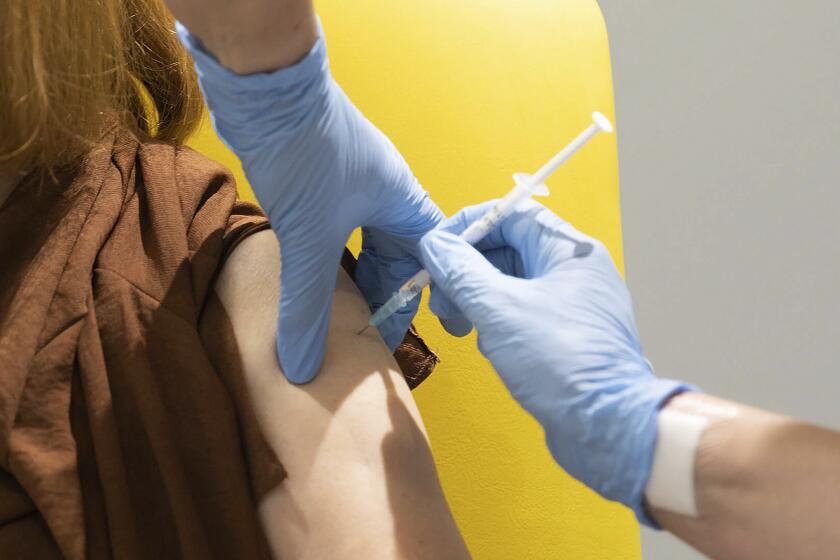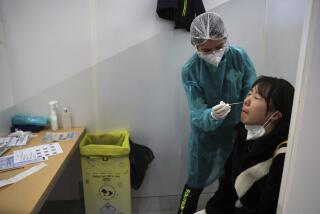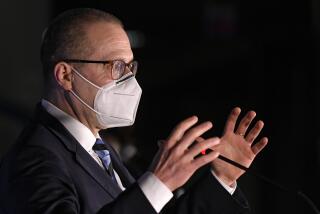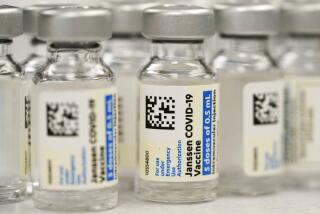AstraZeneca’s COVID-19 shot is ‘safe and effective,’ EU regulator says
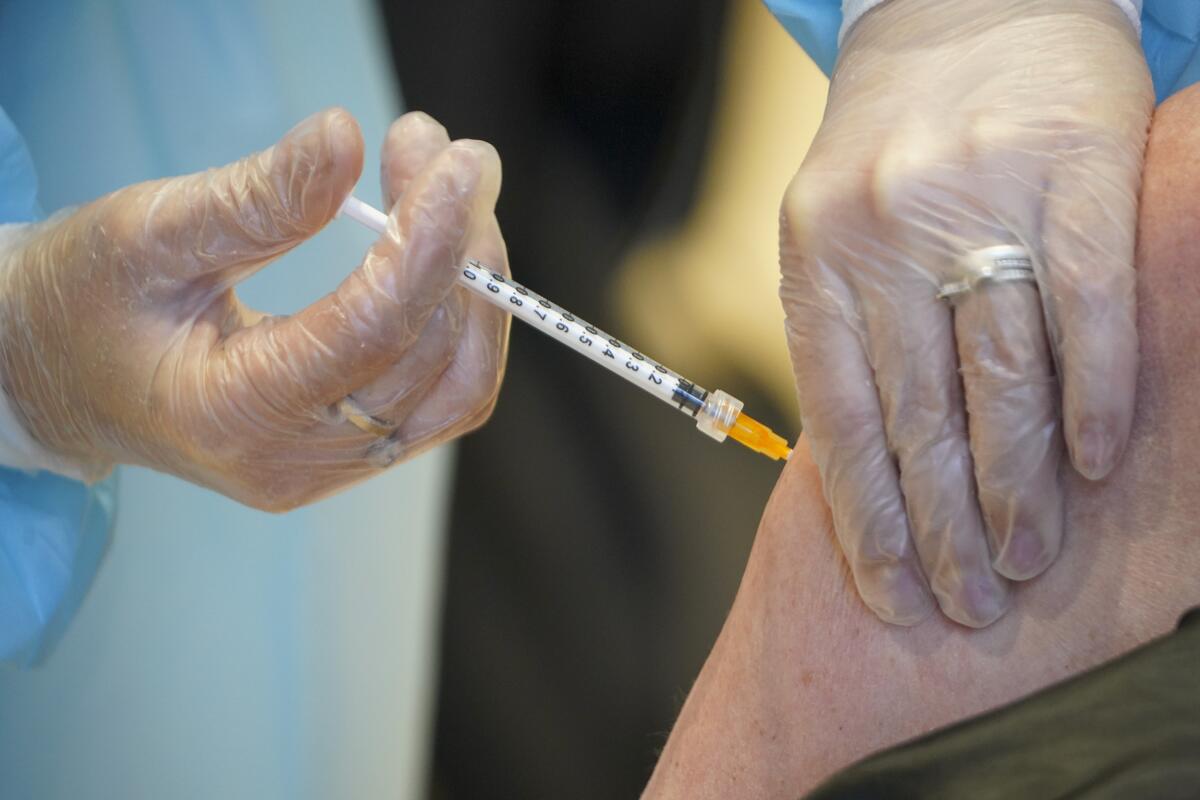
- Share via
LONDON — The European Union’s drug regulator said Thursday that the AstraZeneca vaccine is not linked to an overall increase in the risk of blood clots and that the benefits of use outweigh the risks, paving the way for European countries to resume administering the shots.
Several EU member states had suspended use of the vaccine over the last week following reports of rare types of blood clots occurring in a small number of the millions of people who had received the shot across the continent.
Germany, France and others had said they wanted to wait for the European Medicines Agency’s determination before deciding whether to resume using the vaccine.
“Our scientific position is that this vaccine is a safe and effective option to protect citizens against COVID-19,” said Emer Cooke, the head of the EMA, adding: “If it were me, I would be vaccinated tomorrow.”
However, she said the agency “cannot rule out definitively a link” between the rare types of blood clots and the vaccine. The EMA recommended adding a description of these cases to the vaccine leaflets so that health workers and patients would be aware.
Clots that form in the arms, legs or elsewhere can break free and travel to the heart, brain or lungs, causing strokes, heart attacks or other deadly blockages.
A new study may help answer a big question in the campaign to suppress the coronavirus outbreak.
While many countries have continued to use the AstraZeneca vaccine, there are concerns that the debate could seriously undermine confidence in the shot, which is key to efforts to vaccinate the world’s population, especially in poorer countries.
In Europe, where there is a choice of vaccines, the safety questions have complicated an already slow vaccine rollout across the 27-nation EU at a critical moment when infections are rising at an alarming rate again in many countries, in part because of variants of the coronavirus.
Blood clots have been reported in at least 37 people, and at least four deaths among them have been recorded, out of the 17 million who have received at least one dose of the AstraZeneca vaccine in Europe.
The World Health Organization has said that there is no evidence to suggest the vaccine was responsible and that the benefits of immunization far outweigh the potentially small risk. The drugmaker likewise said it found no increased risk of clots.
The U.K. has approved a second COVID-19 vaccine. AstraZeneca says it aims to supply millions of doses in the first quarter.
AstraZeneca is expected to apply in the coming weeks for U.S. authorization for its vaccine. The U.S. now relies on vaccines from Pfizer, Moderna and Johnson & Johnson.
On Thursday, ahead of the EMA’s announcement, Britain’s drug regulatory agency said there was no evidence that AstraZeneca’s vaccine causes clots, and it urged people to continue getting the shot. Britain was not among the countries that suspended use of the vaccine.
The pause in vaccination using the AstraZeneca shot in some countries came as COVID-19 is surging across the continent and as Britain is expecting major delays in its vaccine deliveries. The EU’s vaccine rollout has also been much slower than anticipated.
Tens of thousands of new daily coronavirus cases have led to the re-imposition of lockdown measures in Italy, a spike in hospitalizations in France and the announcement by German officials that a third COVID-19 wave has begun.
Figures from the European Centers for Disease Prevention and Control this week show that there are about 7 million unused AstraZeneca doses across the 27-nation EU.
The German government defended its decision to suspend use of the vaccine, saying it was based on expert advice.
“Concerns are taken seriously and examined,” government spokeswoman Ulrike Demmer said Wednesday. “And as soon as these concerns are cleared up, a vaccine can be used again without hesitation.”
Germany will rely on the EMA decision to determine how to proceed, Health Ministry spokesman Hanno Kautz said. Other countries, including France, have also indicated that they would follow the advice issued Thursday.
Whenever vaccines are rolled out widely, scientists expect some serious health issues and deaths to be reported, simply because tens of millions of people are receiving the shots. Determining whether or not the vaccine is to blame can be difficult, since most of the people getting inoculated first are those most at risk of the coronavirus.
But because there are no long-term data on any of the COVID-19 vaccines, any potential signal of trouble must be thoroughly investigated.
The European Union’s dispute with AstraZeneca has intensified, with the drugmaker denying it had pulled out of talks on COVID-19 vaccine supplies.
Because clinical trials are only done in tens of thousands of people, extremely rare side effects often aren’t detected until vaccines are used in many millions of people, long after they have been licensed. For example, it took nearly a year after vaccination campaigns began following the 2009 swine flu pandemic for European officials to notice an increase of narcolepsy in children and teenagers who got the GlaxoSmithKline vaccine.
“It’s right to investigate any potential signals of problems, but you can do that while you continue immunization,” said Michael Head, a senior research fellow in global health at the University of Southampton in England.
“The millions of doses being administered means we will see coincidental clusters of conditions,” he said. “If we pause the vaccine rollout every time there’s a possible signal, it won’t be much of a rollout.”
More to Read
Sign up for Essential California
The most important California stories and recommendations in your inbox every morning.
You may occasionally receive promotional content from the Los Angeles Times.
